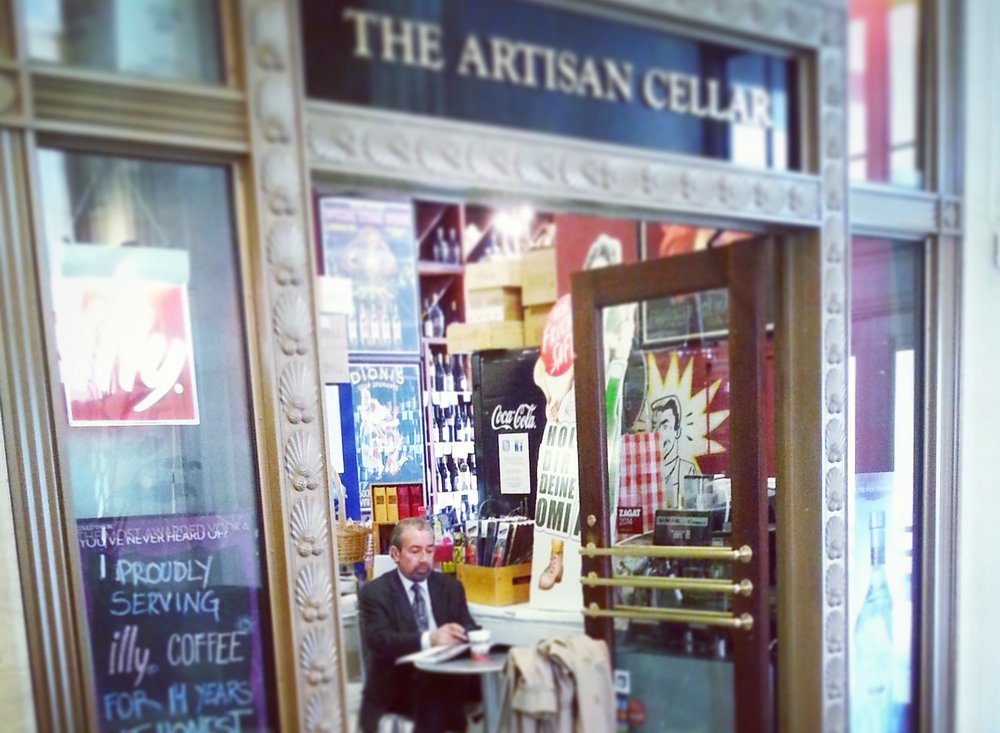Owner Of Artisan Cellar Opens Up About The Freakish Hassle Of Stocking 3 Floyds
By Mae Rice in Food on May 25, 2016 5:27PM
On Tuesday, we wrote about a sign at Merchandise Mart's Artisan Cellar—a combination wine and beer cellar, liquor store and gourmet deli—about why the space no longer carries 3 Floyds. (The sign cited the "manufactured scarcity" of the brewery's beers as their reason for no longer carrying it.) Today, we finally touched base with Artisan Cellar's owner, Philip Bernstein, and got the story behind the sign.
Bernstein told Chicagoist he posted the sign "at least two years ago," and his customers' response to it since then has been "overwhelmingly positive."
"Every craft beer aficionado says 'I agree with you a hundred percent,'" he said. "I don't think it's really hurt my business at all."
As for what prompted him to drop 3 Floyds, he said he was simply "so fed up with non-fulfillment." He said he would call his distributor, and if he asked for five cases of 3 Floyds beers, "either they laugh at you outright, or they send you like one case."
Back when he carried it, 3 Floyds was by far the hardest craft beer for him to track down, Bernstein said. He's run Artisan Cellar in Merchandise Mart since 1999, he said, and "at no time in that period, with this exception, has there any been a problem getting a product in."
"Who wants to do business with a guy who doesn't want to do business with you?" Bernstein said.
He's not sure who, exactly, was blocking him from getting 3 Floyds. It could have been the result of a brewery policy, a distributor policy or both. He believes, though, that whatever cocktail of policies he encountered could be at odds with Illinois liquor laws (as noted in a parenthetical in Bernstein's 3 Floyds sign).
"Should the distribution be anything other than first come first served?" he asked. Bernstein, for one, doesn't think so, and he believes that for 3 Floyds, it likely is.
According to 3 Floyds' FAQ page, though, the scarcity of their beers isn't "manufactured," as Bernstein called it on his sign: it's real. Under the FAQ for store owners looking to procure 3 Floyds, they write:
We’re trying really hard to make more beer, but in many cases we just don’t have enough to go around. Your best bet is to contact the distributor in your area. If you are having problems getting a response from your distributor, you can send us an email from our Contact page, and we’ll see what we can do.
We've reached out to the Illinois Liquor Control Commission, Bernstein's distributor and 3 Floyds for more information on local regulation and the 3 Floyds distribution system. We'll update this post if we hear back.
Update, 3 p.m.: A spokesperson for the Illinois Liquor Control Commission told Chicagoist that according to the Illinois Liquor Control Act's Section 6-17.1, it's illegal for distributors to give preferential treatment to certain buyers when they're selling liquor (or beer). It's unclear if this is what Chicago distributors do with 3 Floyds, but if it is—a hypothesis floated by Bernstein—then those distributors are breaking the law.
Here's how the law itself, passed in 1934, phrases it:
The General Assembly hereby finds and declares that for the purposes of ensuring that all retail licensees have the opportunity to receive alcoholic liquor, reducing the amount of spoiled and overaged alcoholic liquor sold to customers, and maintaining the distribution system and the State's ability to regulate against illegal importation of alcoholic liquor, it is necessary to prevent discrimination among retail licensees[...]. A distributor or importing distributor... for alcoholic liquor... shall use its best efforts to make available for sale to retail licensees, in its designated geographic area or areas, each brand of alcoholic liquor [...]. Nothing in this Section prohibits a distributor or importing distributor from establishing purchase requirements unless the requirements have the effect of excluding a majority of the retail licensees [...] from purchasing the alcoholic liquor.
